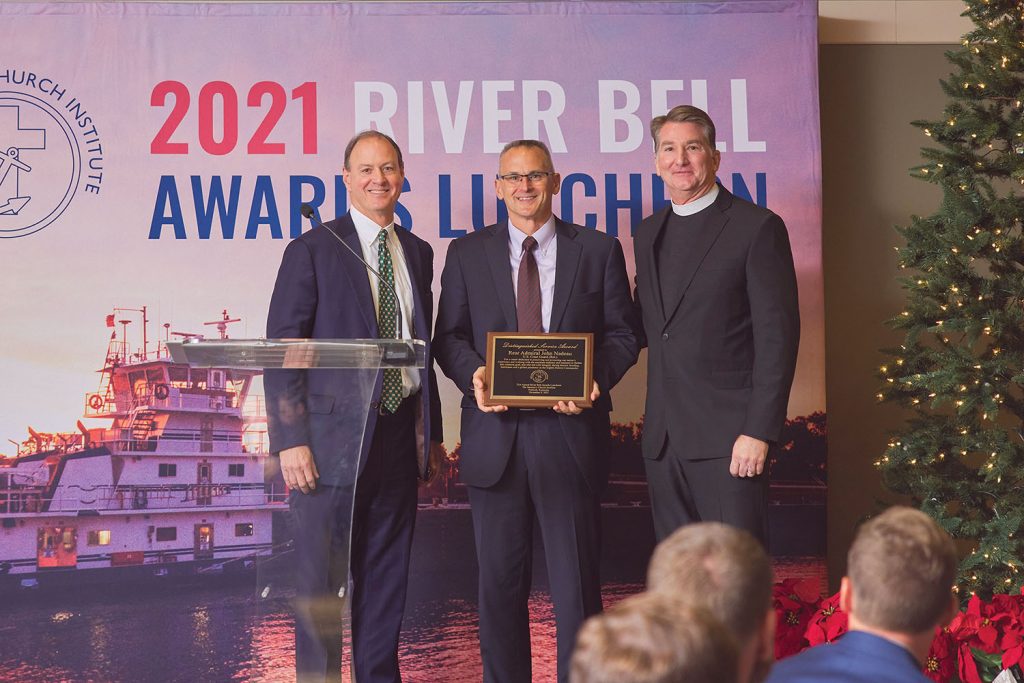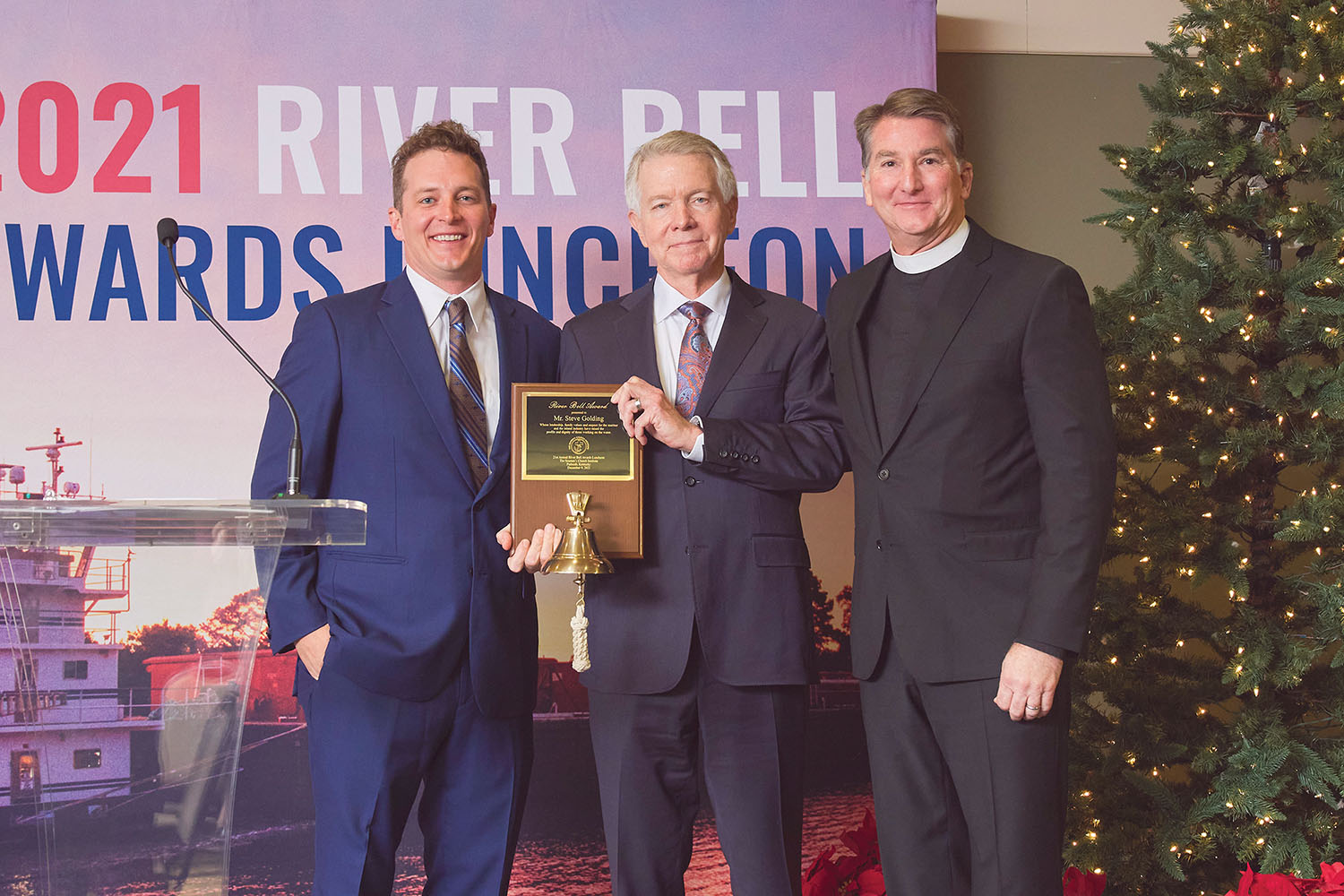In a ceremony that paid tribute to mariners as the essential workers who kept freight moving throughout a global pandemic along with the recognized honorees, the Seamen’s Church Institute held its 21st annual River Bell Awards Luncheon on December 9.
Steve Golding, chairman of Golding Barge Line, received the River Bell Award. U.S. Coast Guard Rear Admiral (Ret.) John Nadeau received the Distinguished Service Award. The crew of the mv. Joseph Merrick Jones of Canal Barge Company received the Lifesaving Award.
Roughly 475 people attended the ceremony, held at the Paducah-McCracken County Convention Center in Paducah, Ky.
The Rev. Kempton Baldridge, SCI’s senior river chaplain, gave the invocation and was also presented with a framed photograph in recognition of his upcoming retirement early next year.
Welcome remarks came from the Rev. Mark Nestlehutt, SCI president and executive director.
“This gathering provides us an opportunity to recognize and celebrate the incredible work of this industry as a whole,” Nestlehutt said. “You, in this room, and the mariners working on the water, make our modern way of life possible. We thank you for all you do to support us and all that you do to support our way of life.”
Nestlehutt also announced that SCI is working to double its Ministry on the River program by adding two more full-time chaplains. SCI is working to raise $5 million over the next year to endow those two positions.
“The good news is we’ve already raised $1.1 million in pledges,” he said.
Damon Judd, luncheon co-chairman as well as president and CEO of Marquette Transportation Company, announced that the luncheon set a new record, raising $330,000 for the important work SCI does to support mariners.

Distinguished Service Award
Merritt Lane, Judd’s luncheon co-chair as well as president and CEO and chairman of Canal Barge Company Inc., kicked off the awards portion of the ceremony by presenting the distinguished service award to Nadeau.
Nadeau is a 32-year veteran of the U.S. Coast Guard. For the past two years, until his retirement in late June, he commanded the Eighth District, overseeing Coast Guard operations in 26 states as well as the Gulf of Mexico coastline from Florida to Mexico, the adjacent offshore waters and outer continental shelf, Houston, New Orleans, Corpus Christi, Port Arthur, Mobile and other Gulf Coast ports and the inland waterways of the Mississippi, Ohio, Missouri and other western rivers. In that position he led 4,500 personnel, 110 Coast Guard units, dozens of cutters and aircraft and hundreds of boats.
In previous roles, he was the Coast Guard’s senior executive for all international and national policy, standards and programs to promote marine safety, maritime security and environmental stewardship. He was responsible for oversight and program management for all Coast Guard commercial vessel inspections, marine casualty investigations, navigation services, commercial regulations and standards, recreational boating safety, port and facility safety and security, waterways management, merchant mariner credentialing, vessel documentation and port state control.
He is currently president and CEO of JPN & Associates, serving as a senior adviser and maritime consultant to owners and operators of commercial vessels, facilities, ports and other maritime stakeholders.
“What is most apparent to those of us who know him is that John Nadeau dedicated his entire career to the service of his country, with an unparalleled focuotecting the inland waterways and a personal commitment and passion for improving marine safety and security,” Lane said. “As Admiral Shultz noted in his address at the change of command, and I quote, ‘What I’ve always respected about John the most was his authenticity, his character and his integrity.’ These attributes, coupled with his experience and ability to work with the maritime industry, served him well, especially when he was commander of the Eighth District. During his two years at the helm, he was faced with historic flooding, a devastating hurricane season in 2020, and to top it all off a global pandemic. Through it all he led with confidence, grace, intelligence, common sense and, yes, authenticity and integrity.”
He also noted that throughout it all Nadeau was especially focused on the professional mariner, personally helping them with situations beyond their control, such as poor conditions aboard vessels.
“His hands-on and personal approach set him apart as a leader within the Coast Guard ranks, and in the industry,” Lane said.
Nadeau said he was humbled to receive the award and that it was quite a privilege, thanked SCI and paid tribute to the other honorees. He then paid tribute to the mariners who make the whole system work.
“Our great nation has inherited this tremendous, valuable network of waterways, which you all know,” he said. “And it’s truly a special gift to the country, one that’s the envy of other nations all around the planet. The network connects this fertile and productive heartland to the world, and this network keeps millions and millions of trucks off the road every day, facilitating clean and efficient movements of cargo, millions of tons of grain, corn, soy, you name it, so many other products that feed and support people all over the world. But this incredible gift cannot produce without the commitment and sacrifice of thousands of mariners who work on the river as well as the mechanics, support staff, all of you in this room that provide them the support so they can get the job done.”
Nadeau talked about standing on the Highway 80 bridge in Vicksburg, Miss., watching tows coming around the bend “with amazement as they would somehow be able to pass between the piers.” He noticed what he called the same finesse when he had the opportunity to get underway for a short time, riding along with a Marquette Transportation crew.
Crews like that one have continued to serve and keep cargo moving despite the challenges of the pandemic, he said, and they are worth recognizing.
“Most businesses were able to simply shut the door, lock it, turn off the lights and send the workforce home, but you can’t clean barges while sitting at your kitchen table on a Zoom call,” Nadeau said. “And you can’t make up a tow in a fleeting area, and you certainly can’t pilot a towboat and safely move 40,000 tons of grain down 700 miles of river while sitting at home on your couch in your pajamas logged into your laptop.”
The entire industry had to overcome new challenges that nobody had ever envisioned, Nadeau said. He acknowledged most people in this country had not realized or taken the time to appreciate this sacrifice, but said he and all those in attendance were incredibly thankful for mariners’ service.
“Working together, we need to support our mariners,” he said. “Working together, we need to advocate for them, and working together we really need to keep them safe and healthy. This is righteous work that deserves constant attention and focus, so may God continue to bless America and to keep our mariners safe.”
Hurricane Ida Response
Following the meal, Rudd acknowledged the challenges of this past year, including the resurgence of COVID-19 with the Delta variant as well as Hurricane Ida making landfall in southeast Louisiana in August.
“Regardless, though, time and time again our industry, when faced with challenges, rallies with an incredible mix of grit, camaraderie and teamwork to tackle the task in front of us, to support our mariners, to truly define our success and to work together to keep America moving safely.”
There may be no better example of that resolve than during Hurricane Ida, he said. When Ida hit on August 29 as a Category 4 storm, exactly 16 years to the day after Hurricane Katrina, the storm’s early and unexpected turn east put a number of the industry’s mariners, facilities and vessels directly in its path.
“The stories of that night are harrowing,” Judd said. “As the storm approached the river, rather than losing steam inland, it seemed to build power and became strong enough where the Mississippi River was actually flowing northbound, not southbound. There are countless stories from that night of mariners working together bravely to keep each other safe, without any regard as to which logos were on their stacks.”
While acknowledging there was plenty of equipment damage to go around, Judd said it was a true blessing that there wasn’t a single material injury that he was aware of from the storm that night and that it was really a testament to all that mariners did working together to keep each other safe.
As the storm passed, others within the industry responded immediately to support their employees and to work together to reopen the system. It is important to note that those who led the response effort were often those on the front lines who had been through the storm either on their vessel or at home and yet showed up day after day, hitch after hitch, “to keep working on behalf of all of us, knowing full well that they’d go home and find their own personal recovery and destruction when they got there.”
SCI’s team of chaplains and chaplain associates responded immediately as well, he said, giving mariners an opportunity to talk about their experiences and ensuring that those affected got the help and support that they needed both then and in the days ahead.
Judd said that luncheon committee members felt it was important to take time at the luncheon to honor and respect everything that those involved did to keep each other safe and to get the industry back up and running “from the moment the storm hit through the ongoing recovery efforts.” He asked everyone to give a quick round of applause “with the hope it can be heard from Baton Rouge to the bayou.”
Lifesaving Award
Col. Robert Hilliard, commander of the Vicksburg Engineer District, presented the Lifesaving Award to the crew of the mv. Joseph Merrick Jones via a video introduction, recognizing how they exhibited the Army values of duty, selfless service and personal courage.
Crew members are Cody Holifield, captain; Adam Dobbs, pilot; Jeffery Buntin, steersman; Stephen Hill, engineer; Joseph Buckley, engineer trainee; David Gatlin, mate; Stephen Garret, deckhand, Evan Bartles, deckhand; Kaddarrious Shields, deckhand; and Charlie Porter, deckhand.
The Joseph Merrick Jones was the industry vessel assigned to assist tows with safe transits through Baton Rouge during prolonged high-water conditions on April 21, 2020. The Vicksburg district dredge Jadwin was southbound when cross currents in the near-record high river caused it to strike one of the Upper Baton Rouge Bridge piers at Lower Mississippi Mile 235.27, breaking its chain of dredge pipeline and causing one of the assist boats for the dredge to capsize. Three people were on board the assist vessel, the mv. Sanderford.
After spotting the Sanderford upside down, the crew of the Joseph Merrick Jones saw two men on the keel while one was being pulled from the water onto the overturned vessel. The crew maneuvered close enough to the Sanderford to begin rescue operations, with the mate throwing life jackets to the men while another crew member threw a life ring. They pulled the pilot and two deckhands onto the Joseph Merrick Jones moments before the overturned vessel sank completely.
Two of the men were not wearing life vests at the time of the incident, “which could have resulted in tragic consequences had it not been for the quick thinking and professionalism of the mv. Joseph Merrick Jones crew during this emergency,” the program for the luncheon noted.
The crew successfully rescued the men with no loss of life or injuries in a matter of a few minutes while the vessels were moving downriver at current speed, which was approximately 6 mph. at that time.
“In the Corps of Engineers, we talk a lot about taking care of others, and on that day back in 2020, the crew of the motor vessel Joseph Merrick Jones took care of us, and so the Joseph Merrick Jones crew are true heroes, and the Vicksburg district is beyond grateful for their selflessness and their bravery,” Hilliard said. “Thank you again for being great partners out on the river.”
River Bell Award
The luncheon’s final recognition was that of Golding, the recipient of this year’s River Bell Award.
Golding began his career on the river at age 15, working at Big River Shipyard in the Vicksburg district. He later worked on board boats of Ole Man River Towing.
After graduating from Mississippi State University in 1972, he went on to lead the company to become a well-established barge line. He then took advantage of an opportunity to sell Ole Man River to Kirby Corporation in 1992.
Golding re-entered the barge industry with the formation of Golding Barge Line in 1995. He, along with his staff, have spent the past 26 years building Golding Barge Line into a well-known barge operation specializing in the movement of refined petroleum, petrochemicals and chemical products. Golding Barge Line owns and operates 28 towboats and 66 tank barges and employs 285 people.
In addition to his work, Golding has served numerous terms on the board of both the American Waterways Operators and Waterways Council Inc. He has served as chairman of the southern region of AWO. He and his wife, Melody, have two sons, Austin Golding and John Reid Golding, and one grandson, 17-month-old Whit.
Austin Golding, who serves as president and CEO of Golding Barge Line, introduced his father, focusing on not only his professional career but also his commitment to being a good son, husband, father and now grandfather.
The elder Golding was born in Greenville, Miss., at a time when boats and towing touched just about everyone in town’s life, he said. Steve Golding’s father and Austin’s grandfather, Thomas Golding, formed a friendship with the Brent family that owned Brent Towing in Greenville. That friendship, along with a passion for small business and the river industry, led Thomas Golding to load his family in a station wagon in 1960 and drive all the way to Guatemala to form the Memphis-Guatemala Line, bringing produce and other commodities from Central America to Memphis, Tenn., via ship.
In the mid-1960s, the family moved back to the United States, to Vicksburg, Miss., where Thomas Golding, once again with the support of the Brent family, started Big River Shipbuilding and then Ole Man River Towing. Steve Golding grew up working in his father’s shipyard, working in every department. He went to Mississippi State University, coming home every summer to work on the boats, earning his tankerman’s ticket, eventually becoming a steersman. After college he became a pilot on the Ohio River.
When the company’s office manager passed unexpectedly, Thomas Golding called his son and told him he was coming home to start running the operation. Steve Golding was 23 at the time and had 10 partners. He worked for the company until selling it to Kirby Corporation.
When Steve Golding formed Golding Barge Line, it originally leased but didn’t own boats or operate any barges. It was headquartered in an outlet mall, between a coffee shop and a dress shop. As the company grew, he said, it moved to the next outlet mall, next to the newspaper and the local gym and a paint store. With a passion for the business and knowing he had two boys coming up, Steve Golding continued to grow the company.
When Steve Golding took the podium from his son, he focused on mentors and relationships.
“You know, I’ll be in this business next year 50 years, and I can honestly say I couldn’t have made it 50 years without the mentors and the relationships, and I’ve been blessed with both, really good ones,” he said.
In addition to the Brent family and his own father, wife and sons, he credited his longtime attorney, Joe Henderson, broker Bill Wainwright and shore-based staff and on-board crew members at the barge line.
Golding also singled out Merritt Lane as an example of the kind of relationships within the industry that helped him prosper.
Lane wrote a letter to a potential Golding Barge Line shipping customer back when the Golding line had two boats and four barges, saying Canal Barge Company would back Golding up if there were ever a problem where Golding was unable to fulfill his contract. Lane never had to step in, Golding said, but he appreciated Lane doing that for him.
“You don’t find that anywhere else,” he said of those kinds of relationships. “It’s a cold, corporate world in a lot of other industries. Our industry is unique.”
Golding also talked about the good work he has seen SCI do, from offering training to the chaplain outreach service, which he has seen counsel crewmen in distress and lead a funeral service for a lost crewman who had no church affiliation.
Finally, Golding finished his speech saying that independent operators need three things to be successful. “Number one, you have to have a supportive spouse and family,” he said.
Secondly, he said it is necessary to have good relationships in the industry.
“Nobody can do it on your own,” he said. “You’re going to have to ask somebody, sometime for help.”
Finally, he said, “You really and truly and sincerely need to care about your mariner because how can you ask him to care about you in the middle of the night when it’s 30 degrees outside if he doesn’t think you care about him?”
Caption for top photo: Austin Golding, left, and Rev. Mark Nestlehutt flank Steve Golding, chairman of Golding Barge Line, who received the River Bell Award at the 21st annual River Bell Awards Luncheon in Paducah, Ky., December 9. (Photo courtesy of Seamen’s Church Institute)




